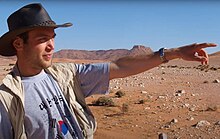Nizar Ibrahim
Nizar Ibrahim | |
|---|---|
 | |
| Born | 1982 (age 41–42) Berlin, Germany |
| Nationality | German |
| Alma mater | University of Bristol (B.Sc.) University College Dublin (Ph.D.) |
| Scientific career | |
| Fields | Paleontology, Anatomy |
| Institutions | University of Detroit Mercy |
Nizar Ibrahim (born in 1982) is a US-based German-Moroccan vertebrate paleontologist and comparative anatomist. He is currently an assistant professor at the University of Detroit Mercy. Ibrahim has led several expeditons to Africa's Sahara and is notable for his research on fossil vertebrates from the Kem Kem Group, including pterosaurs, crocodyliforms, and dinosaurs.[1][2][3] In recent years, research led by Ibrahim radically changed ideas about the morphology and life habits of one of the largest predatory dinosaurs, Spinosaurus aegyptiacus.[4][5] Ibrahim also has interests in bioinformatics and contributed to the NSF-funded Phenoscape project.[6] He regularly engages with the public and is a speaker with the National Geographic Speakers Bureau.[7][8][9]

Biography
Youth and education
Nizar Ibrahim was born on September 8th, 1982 in Berlin, Germany. He has German and Moroccan ancestry, and his grandfather was the third Prime Minister of Morocco, Abdallah Ibrahim.[10] Since his childhood, he has been very enthusiastic about animals and their diversity, anatomy, and evolution. He also loved fiction and nonfiction stories of adventures around the world. At 5 years old, he decided that he was going to become a paleontologist while reading a book on dinosaurs.[11]
He obtained a Bachelor of science in geology and biology from the University of Bristol in 2006. In 2011, he obtained his PhD from University College Dublin's School of Medicine and Medical Science. He carried out his postdoctoral studies at the University of Chicago for four years.[10]
Career
He is currently an assistant professor at the University of Detroit Mercy, where he teaches human anatomy, comparative anatomy, and evolution.[10] Ibrahim is also a visiting researcher at the University of Portsmouth.[12] In Morocco, he works with a number of Moroccan researchers and students based at Hassan II University.[10] Ibrahim is one of 21 people selected as TED fellow in 2015, which makes him the "first paleontologist in the history of the program".[13]
Awards and recognition
- In 2014, he was selected as a member of National Geographic's Emerging Explorer Program.[14]
- In 2015, he was named a TED Fellow.[13]
- In 2015, he was listed in Crain’s “40 Under 40”.[15]
- In 2019, his Spinosaurus discovery was named one of the Top 20 Scientific Discoveries of the Decade by National Geographic. [16]
Selected publications
- Ibrahim, Nizar; et al. (2010-05-26). "A New Pterosaur (Pterodactyloidea: Azhdarchidae) from the Upper Cretaceous of Morocco". PLOS ONE. 5 (5): e10875. Bibcode:2010PLoSO...510875I. doi:10.1371/journal.pone.0010875. ISSN 1932-6203. PMC 2877115. PMID 20520782.
{{cite journal}}: CS1 maint: unflagged free DOI (link) - Ibrahim, Nizar; Kutschera, Ulrich (2013). "The ornithologist Alfred Russel Wallace and the controversy surrounding the dinosaurian origin of birds". Theory in Biosciences. 132 (4): 267–275. doi:10.1007/s12064-013-0192-5. ISSN 1611-7530. PMID 23975643. S2CID 13185739.
- Ibrahim, Nizar; Varricchio, David J.; Sereno, Paul C.; et al. (2014-03-06). "Dinosaur Footprints and Other Ichnofauna from the Cretaceous Kem Kem Beds of Morocco". PLOS ONE. 9 (3): e90751. Bibcode:2014PLoSO...990751I. doi:10.1371/journal.pone.0090751. ISSN 1932-6203. PMC 3946209. PMID 24603467.
{{cite journal}}: CS1 maint: unflagged free DOI (link) - Ibrahim, Nizar; Sereno, Paul C.; et al. (2014-09-26). "Semiaquatic adaptations in a giant predatory dinosaur". Science. 345 (6204): 1613–1616. Bibcode:2014Sci...345.1613I. doi:10.1126/science.1258750. ISSN 0036-8075. PMID 25213375. S2CID 34421257.
- Ibrahim, Nizar; Sasso, C. Dal; et al. (2016). "Evidence of a derived titanosaurian (Dinosauria, Sauropoda) in the "Kem Kem beds" of Morocco, with comments on sauropod paleoecology in the Cretaceous of Africa". Cretaceous Period: Biotic Diversity and Biogeography: 149–159.
- Ibrahim, Nizar; Sereno, Paul C.; et al. (2020-04-21). "Geology and paleontology of the Upper Cretaceous Kem Kem Group of eastern Morocco". ZooKeys (928): 1–216. doi:10.3897/zookeys.928.47517. ISSN 1313-2989. PMC 7188693. PMID 32362741.
{{cite journal}}: CS1 maint: unflagged free DOI (link)
References
- ^ "Three New Species of Flying Reptiles Discovered – Pterosaurs That Inhabited the Sahara 100 Million Years Ago". SciTechDaily. 2020-03-30. Retrieved 2020-06-02.
- ^ Owen, James (2010-05-28). "New Giant Flying Reptile Found; Hunted on Foot?". National Geographic News. Retrieved 2020-06-02.
- ^ "The dinosaur hunter: TED Fellow Nizar Ibrahim searches for lost worlds". TED Blog. 2015-06-05. Retrieved 2020-06-02.
- ^ Ibrahim, N.; Sereno, P. C.; Dal Sasso, C.; Maganuco, S.; Fabbri, M.; Martill, D. M.; Zouhri, S.; Myhrvold, N.; Iurino, D. A. (2014-09-26). "Semiaquatic adaptations in a giant predatory dinosaur" (PDF). Science. 345 (6204): 1613–1616. Bibcode:2014Sci...345.1613I. doi:10.1126/science.1258750. ISSN 0036-8075. PMID 25213375. S2CID 34421257.
- ^ Ibrahim, Nizar; Maganuco, Simone; Dal Sasso, Cristiano; Fabbri, Matteo; Auditore, Marco; Bindellini, Gabriele; Martill, David M.; Zouhri, Samir; Mattarelli, Diego A.; Unwin, David M.; Wiemann, Jasmina (2020-04-29). "Tail-propelled aquatic locomotion in a theropod dinosaur". Nature. 581 (7806): 67–70. Bibcode:2020Natur.581...67I. doi:10.1038/s41586-020-2190-3. ISSN 0028-0836. PMID 32376955. S2CID 216650535.
- ^ https://wiki.phenoscape.org/wiki/Acknowledgments
- ^ https://www.nationalgeographic.com/events/speakers-bureau
- ^ https://philanthropyforum.org/people/nizar-ibrahim/
- ^ https://montecristomagazine.com/community/paleontologist-nizar-ibrahim
- ^ a b c d Ibrahim, Nizar (2020-04-30). "نزار إبراهيم: المغرب جنة الحفريات بالعالم .. و"كم كم" أخطر مكان" [Nizar Ibrahim: Morocco is a paradise of fossils in the world ... and "Kem Kem" is the most dangerous place] (Interview) (in Arabic). Interviewed by youssef lakhder. Hespress.
- ^ Khatla, Kenza (2020-05-07). "Nizar Ibrahim raconte la découverte du Spinoraure marocain". Medias24 (in French). Retrieved 2020-05-30.
- ^ "Palaeontologists reveal 'the most dangerous place in the history of planet Earth'". www.port.ac.uk. Retrieved 2020-05-30.
- ^ a b Jiang, Kevin (2014-12-22). "Nizar Ibrahim named 2015 TED Fellow". Uchicago News. Retrieved 2020-05-31.
- ^ "Postdoctoral scholar Nizar Ibrahim joins ranks of National Geographic's Emerging Explorers". Uchicago news. 2014-05-16.
- ^ "Nizar Ibrahim". Crain's Chicago Business. 2015. Retrieved 2020-05-30.
- ^ Greshko, Michael. "These are the top 20 scientific discoveries of the decade". National Geographic.
